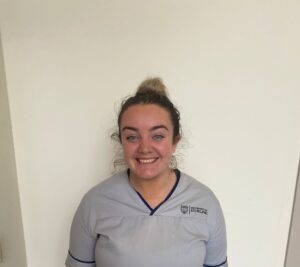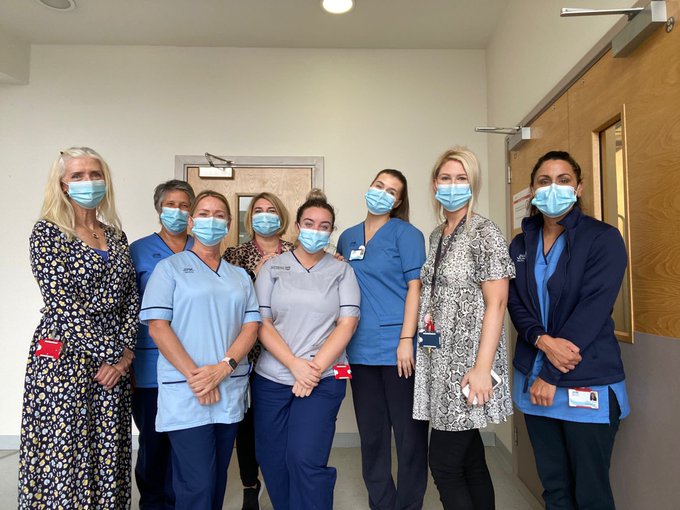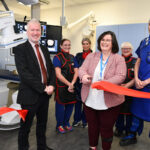Rhianne Shaw, a third-year student nurse, recently completed her management training placement with the Clinical Research Team. This was the first time the team had offered a placement and they received wonderful feedback from Rhianne on her experience with the team which you can read below.
 Rhianne’s experience
Rhianne’s experience
Rhianne said: “Healthcare and nursing both rely heavily on research and the general public and patients both benefit greatly from it. Discovering innovations that allow for earlier diagnosis and more effective treatment is helpful. It can aid in the prevention of illness and improve patient outcomes. Covid-19 has truly put research in the spotlight, which will only strengthen and maintain the goal research has to tackle all health conditions.
“From of my experience in clinical research, I instantly felt like a member of the team. They are extremely friendly and embody all of NHS Forth Valley’s values. They made me feel incredibly valued and welcomed me into the team. They are friendly, funny, and compassionate.
“Never was I made to feel unimportant or out of place. They valued my thoughts, encouraged them, and included me in team meetings and discussions. They had faith in my abilities and frequently asked me to assist them in the labs or take blood samples during clinic visits or ward visits. They also give me the freedom to run my own clinics and see patients of my own. They are the friendliest team I have ever worked with and were more than eager to help. They constantly encouraged me to expand my knowledge and study extra things. They were such a fantastic team to work with, and I genuinely believe that they considered me a team member and more than just a student.
“I have been lucky enough to participate in the SIREN study which examines Covid-19 re-infection rates in healthcare workers. Blood samples are collected every two weeks after a positive PCR test, and we administered PCRs to hospital staff and obtained blood four times each week. In all of Scotland, NHS Forth Valley has the highest participant retention rate, and the staff were constantly keen to enquire about their own antibody levels.
“Working with clinical research healthcare support worker Angela, I was able to assist with the management of this trial. She gave me the confidence to run this trial on my own because she supported and encouraged me and was also available to help me when I needed her. She helped me greatly in developing my confidence with my venepuncture skills and taught me how to spin blood in the laboratory using the centrifuge. I was given access to book participants into clinic and this allowed me to work autonomously and control my own participants. This clinical trial was ideal for me to develop confidence in research, and I loved being a part of it.
“The MICAH study looks at alcoholic hepatitis which is a type of alcohol-related liver disease that causes liver failure after a period of excessive alcohol intake. Currently, a liver biopsy is used to diagnose alcoholic hepatitis, and it is difficult to predict how the disease will progress and how to choose the best treatment. The study looks into ways to reduce mortality in people with alcoholic hepatitis. Patient samples and data are analysed to see whether a blood test can diagnose alcoholic hepatitis and prevent the necessity for a liver biopsy. I assisted with taking blood samples from MICAH participants and obtained their consent for the trial. Due to the nature of this trial there were many personal questions relating to their alcohol intake and this further developed my communication skills and exposed me to an area of care I hadn’t seen before.
“The SOCCS3 study gathers data from bowel cancer patients in Scotland to explore if the information may be used to identify additional people at risk of developing the disease and fully understand the genetic basis of bowel cancer. The study also aims to discover which factors, such as family history, influence how long patients live after being diagnosed with bowel cancer. I was allowed to observe these clinics, prepare the packs, and take blood from the participants. This was of great relevance to me because it relates to my newly qualified job. The team recognised this and made certain that I saw and engaged in the trial.
“I spent a lot of time in the labs and learned how to use centrifuges and now feel competent in spinning blood and urine so can understand and apply this to multiple trials. Clinical research is an excellent placement for student nurses since it provides a wide range of skill development opportunities as well as the chance to develop management skills. Students can practise using labs and specialised equipment. It provides a better grasp of what happens in labs and what role they play in patient care.
“Each trial focuses on a specific specialty, such as orthopaedics, oncology, or surgical. This helps student’s gain knowledge in a wide range of areas while encouraging them to consider unique and innovative ideas within that sector. Students can collaborate with a diverse range of professional members, including ward staff, doctors, consultants, principal investigator, surgeons, and the research governance team to boost confidence and communication skills. It also aids students in understanding the roles of various research staff members. I have had numerous opportunities to practise my venepuncture in a calm and controlled environment, where I have been able to develop my technique on more accessible and less accessible veins. This has helped me gain confidence and is a skill I can apply in any setting.
“Even though NHS Forth Valley’s clinical research department is already outstanding, it will only get better under the leadership of newly appointed team leader Anne Todd. In the weeks I was there, I observed not only Anne’s tenacity and desire to advance and enhance research, but also the team’s collective drive. I strongly believe that through university modules, the curriculum, and as a placement option, student nurses should be given the chance to engage in more research. They gain a much wider range of information and it’s an excellent opportunity for them to get to know the hospital. They will be able to support studies by assisting with patient identification, patient assessments and other activities.
“I loved every minute of working in clinical research and will always be a huge supporter. I am really looking forward to seeing where they go next, and I feel so lucky to have been a part of the team and to have had this experience. Because of my newfound interest in research, I have become a better student nurse and will continue to develop as an innovative thinker.”
Anne Todd, Trials Practitioner and Team Lead, Clinical Research Team
Anne Todd, Trials Practitioner and Team Lead, Clinical Research Team, Forth Valley Royal Hospital, said it was a great experience for the team as well as they loved having Rhianne and sharing her passion for research, enthusiasm & energy.
She explained: “Rhianne joined our team as part of a management placement within the oncology unit. She arrived open to learn and quickly settled into the team. Rhianne was able to gain project management experience with the Siren study, scheduling participant appointments and organising research samples. She achieved her Good Clinical Practice certificate which is valid for two years and she gained experience across oncology, gynaecology and hepatology projects.
“Rhianne was always eager to learn new skills and support colleagues. She gained new knowledge and skills with research protocols, data collection, patient management and also sample processing and also experience using the EDGE research management database.
“Her thoughtful person-centred care often led to reflective discussions around participant experiences and differing conditions. She helped identify new ways to share research with nursing and medical students, ideas we will take forward to offer new experiences. We were thankful to have had the opportunity to support Rhianne’s development during her final placement and hope to have given her a lifelong interest in research and its application in healthcare.”




